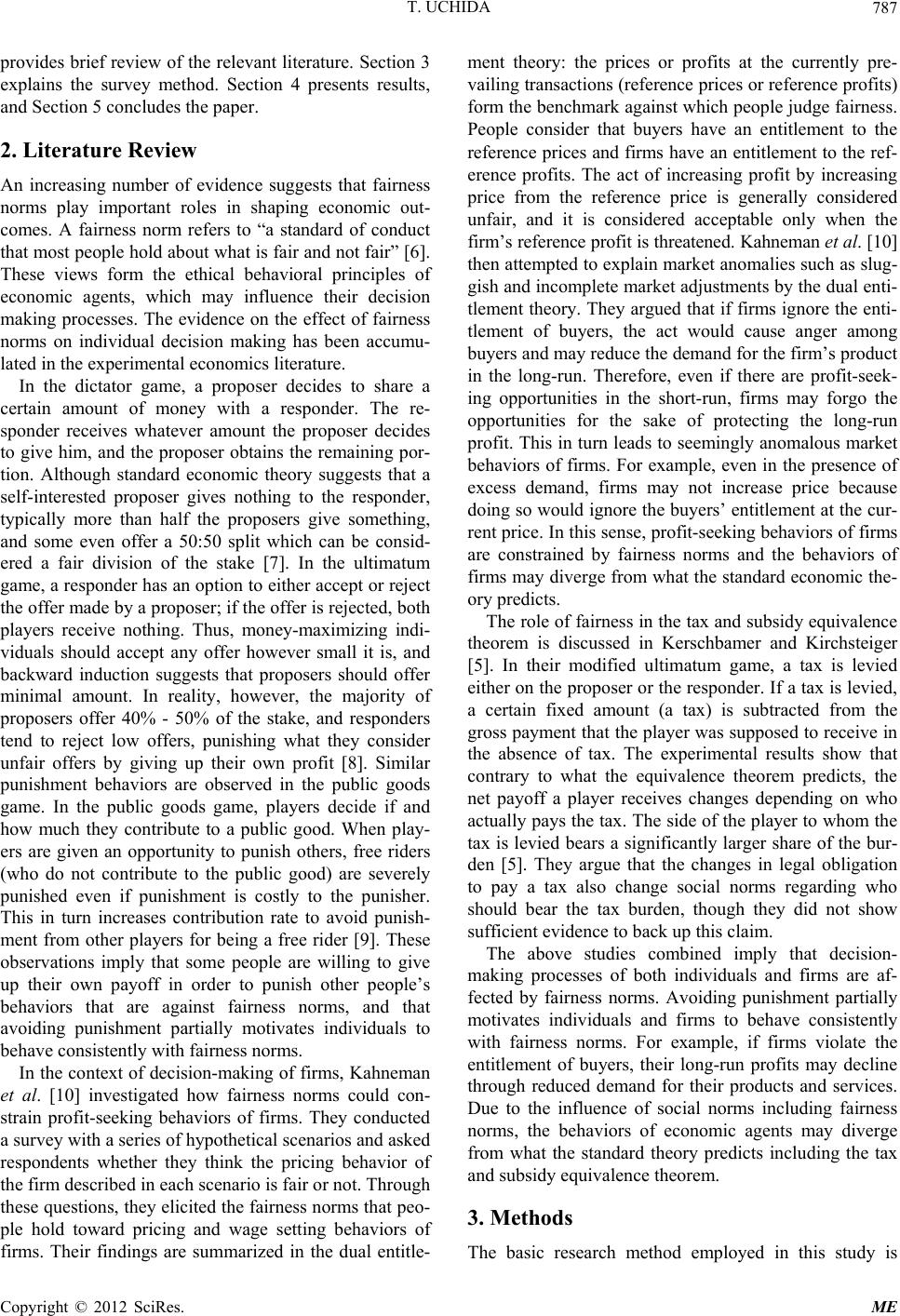
T. UCHIDA 787
provides brief rev iew of the relevant literature. Section 3
explains the survey method. Section 4 presents results,
and Section 5 concludes the paper.
2. Literature Review
An increasing number of evidence suggests that fairness
norms play important roles in shaping economic out-
comes. A fairness norm refers to “a standard of conduct
that most people hold about what is fair and not fair” [6].
These views form the ethical behavioral principles of
economic agents, which may influence their decision
making processes. The evidence on the effect of fairness
norms on individual decision making has been accumu-
lated in the experimental economics literature.
In the dictator game, a proposer decides to share a
certain amount of money with a responder. The re-
sponder receives whatever amount the proposer decides
to give him, and the proposer obtains the remaining por-
tion. Although standard economic theory suggests that a
self-interested proposer gives nothing to the responder,
typically more than half the proposers give something,
and some even offer a 50:50 split which can be consid-
ered a fair division of the stake [7]. In the ultimatum
game, a responder has an option to either accept or reject
the offer made by a proposer; if the offer is rejected, both
players receive nothing. Thus, money-maximizing indi-
viduals should accept any offer however small it is, and
backward induction suggests that proposers should offer
minimal amount. In reality, however, the majority of
proposers offer 40% - 50% of the stake, and responders
tend to reject low offers, punishing what they consider
unfair offers by giving up their own profit [8]. Similar
punishment behaviors are observed in the public goods
game. In the public goods game, players decide if and
how much they contribute to a public good. When play-
ers are given an opportunity to punish others, free riders
(who do not contribute to the public good) are severely
punished even if punishment is costly to the punisher.
This in turn increases contribution rate to avoid punish-
ment from other players for being a free rider [9]. These
observations imply that some people are willing to give
up their own payoff in order to punish other people’s
behaviors that are against fairness norms, and that
avoiding punishment partially motivates individuals to
behave consistently with fairness norms.
In the context of decision-making of firms, Kahneman
et al. [10] investigated how fairness norms could con-
strain profit-seeking behaviors of firms. They conducted
a survey with a series of hypothetical scenarios and asked
respondents whether they think the pricing behavior of
the firm described in each scenario is fair or not. Through
these questions, they elicited the fairness norms that peo-
ple hold toward pricing and wage setting behaviors of
firms. Their findings are summarized in the dual entitle-
ment theory: the prices or profits at the currently pre-
vailing transactions (reference prices or reference profits)
form the benchmark against which people judge fairness.
People consider that buyers have an entitlement to the
reference prices and firms have an entitlement to the ref-
erence profits. The act of increasing profit by increasing
price from the reference price is generally considered
unfair, and it is considered acceptable only when the
firm’s reference profit is threatened. Kahneman et al. [10]
then attempted to explain market anomalies such as slug-
gish and incomplete market adjustments by the dual enti-
tlement theory. They argued that if firms ignore the enti-
tlement of buyers, the act would cause anger among
buyers and may reduce the demand for the firm’s product
in the long-run. Therefore, even if there are profit-seek-
ing opportunities in the short-run, firms may forgo the
opportunities for the sake of protecting the long-run
profit. This in turn leads to seemingly anomalous market
behaviors of firms. For example, even in the presence of
excess demand, firms may not increase price because
doing so would ignore the bu yers’ entitlement at the cur-
rent price. In this sense, profit-seeking behaviors of firms
are constrained by fairness norms and the behaviors of
firms may diverge from what the standard economic the-
ory predict s.
The role of fairness in the tax and subsidy equivalence
theorem is discussed in Kerschbamer and Kirchsteiger
[5]. In their modified ultimatum game, a tax is levied
either on the proposer or the responder. If a tax is levied,
a certain fixed amount (a tax) is subtracted from the
gross payment that the player was supposed to receive in
the absence of tax. The experimental results show that
contrary to what the equivalence theorem predicts, the
net payoff a player receives changes depending on who
actually pays the tax . The side of the player to whom the
tax is levied bears a significantly larger share of the bur-
den [5]. They argue that the changes in legal obligation
to pay a tax also change social norms regarding who
should bear the tax burden, though they did not show
sufficient evidence to back up this claim.
The above studies combined imply that decision-
making processes of both individuals and firms are af-
fected by fairness norms. Avoiding punishment partially
motivates individuals and firms to behave consistently
with fairness norms. For example, if firms violate the
entitlement of buyers, their long-run profits may decline
through reduced demand for their products and services.
Due to the influence of social norms including fairness
norms, the behaviors of economic agents may diverge
from what the standard theory predicts including the tax
and subsidy equivalence theorem.
3. Methods
The basic research method employed in this study is
Copyright © 2012 SciRes. ME